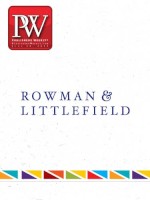Matt Bell, 32, admits he’s surprised that he dwells so much upon marriage and fatherhood in his writing. He chalks it up to age: “It’s a common concern among people in my age group: finding a partner, deciding whether or not to have kids.” In marked contrast to the unnamed narrator and his wife in Bell’s fantastical debut novel, In the House upon the Dirt Between the Lake and the Woods, out this month from Soho Press, as well as the 26 fathers in his apocalyptic novella, Cataclysm Baby (Mud Luscious Press, 2012), Bell insists that his marriage is “great.” He thinks “a lot” about being a good husband and partner.
An assistant professor in the English department at Northern Michigan University and a senior editor at Dzanc Books, Bell says of his nine-year marriage to Jessica, an assistant professor in N.M.U.’s chemistry department: “We’ve both worked hard to give each other the life we want.”
Last summer, the couple moved from Ann Arbor to Michigan’s sparsely populated Upper Peninsula, which is connected to the rest of the state only by a five-mile-long suspension bridge, to take up their new jobs at N.M.U.
In the House is set in a mythical world to which a newly married couple has retreated to live in isolation, away from the vicissitudes of modern society; they plan to fish, hunt, and, hopefully, raise the children they desperately want. But the author says that any resemblance between the novel’s dark and ominous setting and his new home is purely coincidental.
One would hope so. The newlyweds in Bell’s terrifyingly beautiful novel are torn apart, the place where they’ve chosen to nest turns against them, and their personal trauma is made physical. Strange objects and creatures appear, and the scariest place is the labyrinth underneath the house into which the woman disappears.
Bell insists that the setting “isn’t representative of any place except itself.” There are, in his opinion, two kinds of writers out there: those who represent the world just as they perceive it, and those who take “the fairy-tale path,” creating a wholly contained world.
Bell says that he writes “in sentences” rather than from an outline, preferring to “create rather than represent.” Even though it’s “messy” and involves multiple drafts, it both inspires and motivates him.
“I’m following the language—trying to follow whatever I think is powerful. I don’t know why my characters are doing the things that they’re doing,” he says, adding, “I don’t know what things are yet.”
In the House upon the Dirt Between the Lake and the Woods is fantasy, Bell notes, but the “emotional heart of it is something very recognizable; it can sneak up on you.” Much of his fiction, he points out, explores a fear of loss, as well as the need to forgive and be forgiven. “A lot of the stuff I’ve written is this fear of hurting or losing the people you love; the easiest place to access that is parenting, or marriage, or childbirth.”
He’s “constantly struck” that the people we care about the most—spouses, children, parents—are “inevitably” also the ones most likely to let us down. “There’s something tragic about that,” Bell says, “but there’s also something beautiful about the fact that we constantly have to forgive each other, constantly need to renew the bonds between ourselves.”
Without going into detail, he speculates at one point that these recurring themes in his writings might have to do with his own family dynamics. The son of a computer programmer and a first-grade teacher, Bell and his four younger siblings grew up five miles outside of Hemlock, a rural community in central Michigan. After initially studying computer science in college, Bell dropped out, promising himself at the time that he’d read “a book of science, history, or philosophy every week” so he’d keep learning. By the time he resumed his studies full-time in 2003—at Oakland University in suburban Detroit—Bell “wanted to read instead of doing computers,” and majored in English. Graduating with a B.A. in 2006, he subsequently earned an M.F.A. at Ohio’s Bowling Green State University in 2010. Bell’s first short story collection, How They Were Found, was published that same year by Keyhole Press. His new publisher, Soho, is solidly behind Bell’s latest effort. He is touring the country, reading from In the House from New York City to Texas, and from Michigan to Colorado, California, and the Pacific Northwest.
Bell’s stories have been widely anthologized and he’s best known for short fiction, but he discloses that he’s moving into longer stories and novellas. And after completing one novel and the first draft of a second one, he’s “pretty intoxicated” with the format. While he enjoys the changes in voices, forms, and characters that come with writing short fiction, writing longer, in a sense, provides the same pleasures on a much more essential level.
A novel, he points out, is written “not by who you are on any one particular day,” but by the “many persons you are becoming, each slightly different, across 300 or 600 or 1,000 days.”



 Volume 260
Issue 23
06/10/2013
Volume 260
Issue 23
06/10/2013





